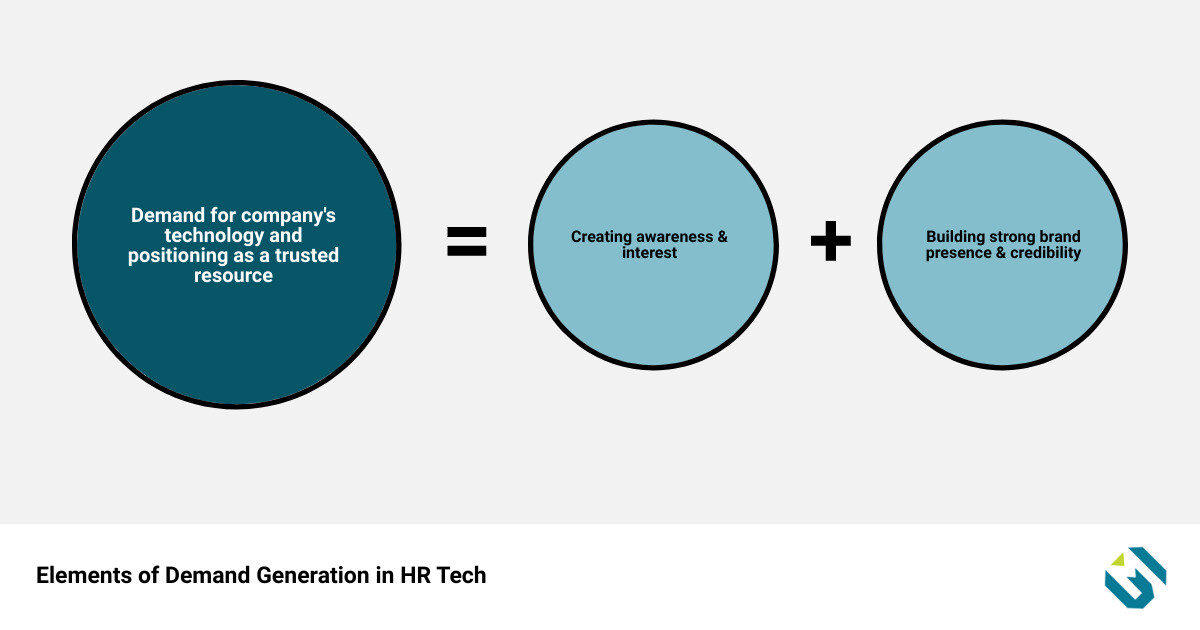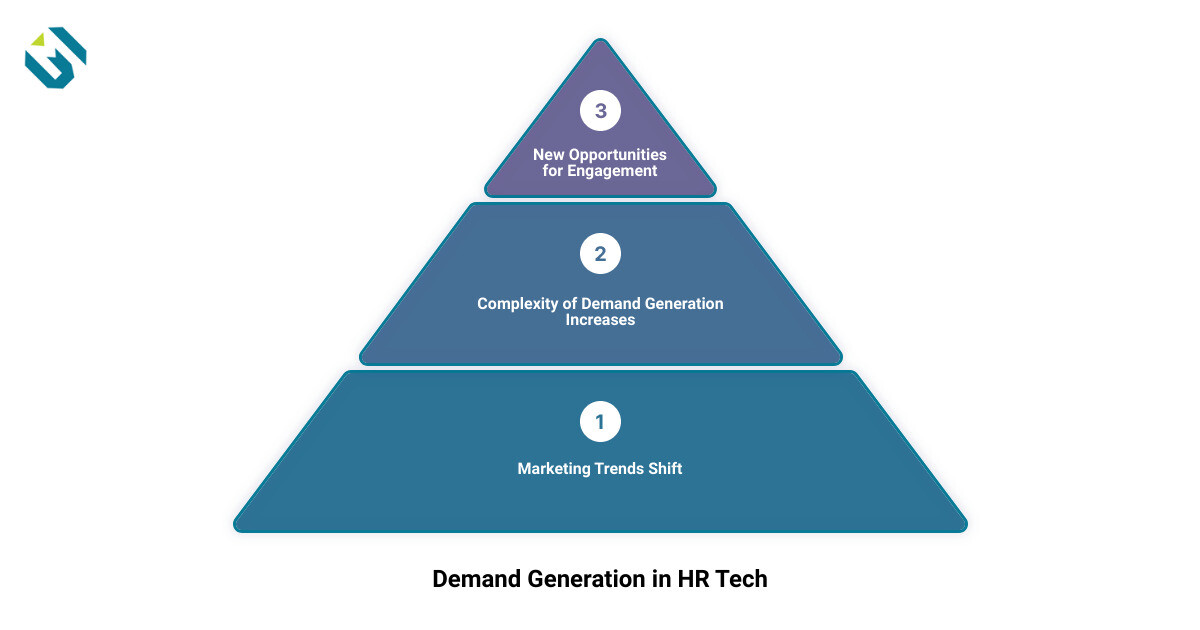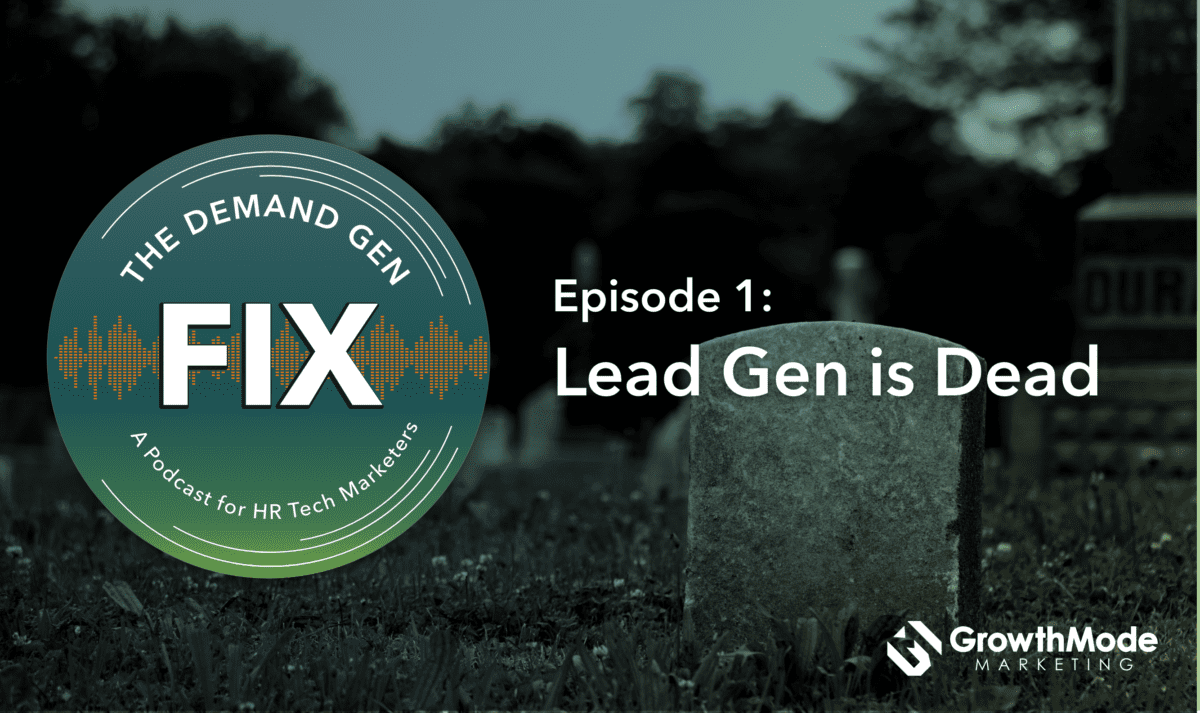This article was written by AI and is unedited. We are testing the technology to determine results.
In the bustling sphere of human resource technology, there’s a silent revolution brewing, and it’s all powered by the might of demand generation. This strategic approach to marketing is proving to be a game-changer for HR tech buyers, transforming the way businesses connect with their target audience. At GrowthMode Marketing, we understand the struggle of HR technology companies in navigating through a cluttered market, and the importance of brand visibility amidst an explosion of tech solutions. But, the key to unlocking their untapped potential lies not just in having a high-quality product but in the ability to efficiently reach the HR tech buyer.
Today’s dynamic HR tech market is heavily influenced by the shift towards digitization and flexibility, amplified further by the COVID-19 pandemic. Living in a time where remote work is becoming increasingly common, HR solutions that support this trend, boost employee engagement, streamline processes, and cater to a geographically dispersed workforce are highly sought after. However, with the global human resource technology market forecasted to reach $76.5 billion by 2031, there’s an intense race among companies to capture a piece of this exponential growth. This is where demand generation swoops in to play a crucial role.
In essence, demand generation is a holistic marketing strategy, moving beyond merely generating leads to focus on long-term customer engagement. It’s a beacon that guides our efforts towards building a robust brand presence, fostering trust, and nurturing relationships with potential customers. The goal is straightforward yet challenging – create a demand in the market for your technology. For HR tech companies, this involves leveraging creative tactics like content marketing, social media engagement, webinars, partnerships with influencers, and more.
Quick Snippet: Demand Generation in a Nutshell
– Creates awareness and interest in a company’s products/services
– Builds a strong brand presence and credibility
– Creates a demand in the market for a company’s technology
– Offers real value to the target audience, positioning the company as a trusted resource in the HR tech space
Understanding the HR Tech Buyer: Key Insights and Challenges
In the rapidly evolving world of HR technology, understanding the buyer is crucial for success. From their budget constraints to their unique industry needs, these insights form the foundation of an effective demand generation strategy.
The Average HR Software Budget: A Look at Industry Variations
In the realm of HR technology, budgets can vary significantly. According to research from Gartner, the average HR software budget typically ranges from $10 to $21 per employee, per month. However, multiple factors can affect this estimate. The size of the organization, the number of users, and the specific features required can all have a significant impact on the budget.
Given these variations, it’s crucial for us at GrowthMode Marketing to tailor our demand generation strategies to align with our client’s financial capabilities. We strive to create strategies that not only align with their budget but also deliver considerable return on investment.
The Importance of Advanced Functionality for Tech Companies
In certain industries, advanced functionality is a top priority. For instance, software and technology companies are often willing to invest more for HR software with features like applicant tracking systems (ATS) and automated screening processes. These capabilities allow them to handle high volumes of job applications efficiently.
Understanding these needs, we ensure our clients are positioned as providers of cutting-edge solutions. We highlight their unique features that address these industry-specific requirements, thereby enhancing their brand value and appeal to their target audience.
The Unique Needs of Different Industries: Construction, Healthcare, and Remote Workforces
Different industries have distinct needs when it comes to HR technology. For example, due to the seasonal nature of work in the construction industry, HR software that tracks time and attendance while ensuring regulatory compliance is highly valued.
In the healthcare sector, HR tools are crucial for managing employee records, ensuring compliance with healthcare regulations, and handling scheduling and time tracking for clinical staff. Meanwhile, industries with a remote or mobile workforce, such as maintenance and field service companies, often require HR software with employee self-service portals and mobile access.
Recognizing these unique needs, we at GrowthMode Marketing tailor our demand generation strategies to highlight how our clients’ HR tech solutions can meet these specific industry requirements. By doing this, we not only drive demand for our clients’ solutions but also establish them as trusted partners in their respective industries.
In conclusion, understanding the HR Tech buyer is no small feat, given the diversity of their needs and budgets. However, with a deep understanding of their challenges and requirements, we can create powerful demand generation strategies that resonate with them, build trust, and ultimately convert them into customers.
The Power of Demand Generation: Building Brand Awareness and Trust
Stepping into the arena of demand generation can be a game changer for HR tech companies. This powerful marketing strategy can help them stand out in a crowded market, engage with their ideal customer profile, and generate high-quality leads that convert into sales.
The Buyer’s Journey: From Awareness to Purchase
Understanding the buyer’s journey is crucial to any successful demand generation strategy. The journey typically starts with awareness, where potential customers become aware of your brand and the solutions you offer.
Next comes consideration, where these individuals begin to think about your offerings in relation to their needs. Finally, there’s the decision stage, where they decide whether or not to purchase your product or service. In all these stages, demand generation plays a pivotal role in guiding the customer through their journey, building trust, and ultimately driving conversions.
At GrowthMode Marketing, we recognize the importance of this journey and build our demand generation strategies around it. We create targeted content that resonates with our audience at each stage, ensuring they receive the right message at the right time.
The Impact of Content: Organic Posts, Newsletters, Podcasts, Videos, and Communities
The role of content in demand generation cannot be overstated. From organic posts and newsletters to podcasts, videos, and online communities, content is the vehicle that carries your brand message to your audience.
As an HR tech company, you need to create informative and engaging content that offers real value to your audience. This could be in the form of blog posts that tackle key HR challenges, podcasts that share industry insights, or webinars that provide practical solutions to common issues.
Remember, the goal is not just to promote your product or service, but to position your company as a trusted authority in the HR tech space. By consistently providing valuable content, you can build trust with your audience, making them more likely to choose your solutions when they are ready to buy.
The Role of Demand Capture Channels and Sales Outreach Sequences
Demand capture channels and sales outreach sequences are integral parts of a successful demand generation strategy.
Demand capture channels, such as email marketing campaigns, social media posts, or webinars, help you harness the interest generated by your content and guide potential customers further down the sales funnel. These channels are your tools for deepening engagement, nurturing relationships, and ultimately driving conversions.
Sales outreach sequences, on the other hand, enable direct communication with your potential customers. These can be highly effective in providing personalized experiences, addressing specific concerns, and nudging prospects towards making a purchase.
At GrowthMode Marketing, we use a combination of demand capture channels and sales outreach sequences to engage with our audience, build relationships, and encourage them to take the next step in their buyer’s journey.
In conclusion, demand generation is an incredibly powerful tool for HR tech companies looking to build brand awareness, establish trust, and generate high-quality leads. By understanding the buyer’s journey, leveraging the power of content, and utilizing demand capture channels and sales outreach sequences, these companies can truly unlock the potential of demand generation and drive their business forward.
The Evolution of Demand Generation: A Mix of Approaches for HR Tech
The world of demand generation is ever-evolving, requiring HR tech companies to adapt and innovate in order to stay competitive. By harnessing the power of a mix of different marketing approaches, these companies can effectively reach their target audience and drive growth.
The Role of Email Marketing, Social Media Marketing, Search Engine Marketing, and Online Advertising
Gone are the days when demand generation for HR tech was solely about email marketing and cold calling. Today, it encompasses a wide variety of tactics such as social media marketing, search engine marketing, and online advertising. Each of these tactics offers unique advantages and needs to be utilized strategically based on your business goals, target customer profile, and market segment.
For instance, social media marketing can be an effective way to engage with prospective customers, build brand awareness, and promote your thought leadership. On the other hand, search engine marketing and online advertising can help boost your visibility online and attract high-quality leads to your website.
At GrowthMode Marketing, we understand the unique role that each of these tactics plays in a successful demand generation strategy. We leverage our expertise in these areas to help our clients optimize their marketing mix and maximize their ROI.
The Importance of a Balanced Marketing Mix: Insights for Startups and Established Enterprises
While it’s essential to leverage a mix of marketing tactics, it’s equally important to strike the right balance based on your business context. For instance, established enterprises with substantial budgets and existing pipelines can afford to adopt a more balanced marketing mix, leveraging multiple tactics for ongoing market penetration.
On the other hand, startups that are yet to receive their Series A funding and are looking to bridge the next 120 days with sales traction may not have the luxury of a balanced mix. They typically need more focused and cost-effective strategies to generate measurable pipeline and sales momentum.
At GrowthMode Marketing, we help our clients find the right balance in their marketing mix, aligning their tactics with their business goals, budget, and market conditions.
The Rapid Changes in B2B Marketing: The Leading Role of HR Tech
The B2B marketing landscape is changing rapidly, and the HR tech industry has been at the forefront of these changes. The shift to inbound marketing, content marketing, and social media B2B marketing are just a few trends that HR tech has been pioneering.
These innovative trends present both challenges and opportunities. While they have increased the complexity of demand generation, they have also created new opportunities for HR tech companies to engage with their target audience and differentiate themselves in a crowded market.
At GrowthMode Marketing, we help our clients navigate these changes, leveraging the latest trends to create effective demand generation strategies. We believe in basing our strategies on real data and evidence, ensuring that our tactics are not just current, but also effective in driving results.
In conclusion, the evolution of demand generation in HR tech calls for a mix of approaches, a balanced marketing mix, and an understanding of the rapid changes in B2B marketing. By embracing these changes, HR tech companies can stay ahead of the curve and drive their growth in this dynamic landscape.
Bridging the Gap Between Marketing and Sales: The Role of Demand Generation
As we navigate the complexities of the HR tech landscape, one thing has become abundantly clear: the need to bridge the gap between marketing and sales. More than ever before, these two departments need to be in sync, working cohesively to drive growth and achieve business objectives. That’s where the power of demand generation comes in.
The Importance of Generating Qualified Sales Leads
Generating qualified sales leads is at the heart of any successful demand generation strategy. But it’s not just about volume—it’s about quality. High-quality leads are those who have shown genuine interest in your product or service and are more likely to convert into customers.
At GrowthMode Marketing, we understand that every lead isn’t a good lead. We focus our efforts on attracting prospects that fit your ideal customer profile, ensuring that the leads you receive are not only interested in what you offer but are also a good fit for your business, product, and price point. This approach, anchored in real data and evidence, paves the way for shorter sales cycles, higher close rates, and lower customer acquisition costs.
The Power of Inbound Marketing, Content Marketing, and Social Media B2B Marketing
In the evolving HR tech marketplace, traditional marketing methods are no longer enough. Today’s B2B buyers are savvy and well-informed, often conducting extensive research before reaching out to potential vendors. To effectively reach and engage these buyers, we must leverage the power of inbound marketing, content marketing, and social media B2B marketing.
Inbound marketing involves creating and sharing valuable content designed to attract and engage your target audience. This approach helps us establish our clients as trusted authorities in the HR tech space, driving more quality leads to their door.
Content marketing takes this a step further, offering valuable insights that solve your audience’s problems. This could include informative blog posts, eBooks, whitepapers, or webinars. It’s all about providing real value to your audience, not just selling your product or service.
And let’s not forget about social media. With the right strategy, social networks can be a powerful tool for reaching and engaging your target audience, building brand awareness, and driving traffic to your website.
The Need for Real Data and Evidence in Choosing a Marketing Mix
In the fast-paced world of HR tech, opinions and trends can change in the blink of an eye. That’s why at GrowthMode Marketing, we don’t just rely on opinions—we look for real data. Data that supports what’s working now, what’s resonating with your target audience, and what’s driving results.
We conduct thorough analysis for our clients, looking at both cost and effectiveness for lead and demand generation. These insights allow us to fine-tune our strategies, ensuring that we’re aligning our efforts with what’s proven to work in your specific market segment.
In conclusion, when it comes to demand generation for HR tech buyers, it’s about more than just generating leads. It’s about understanding your target customer, aligning marketing and sales efforts, and leveraging data to inform your strategies. By bridging the gap between marketing and sales, we can unlock the true power of demand generation and drive meaningful growth for your business.
The Impact of Demand Generation on HR Tech Buying: Building a Brand and Providing Value
As we continue to explore the landscape of HR tech buying, it’s important to understand the pivotal role that demand generation plays. It’s not just about generating leads, but about creating a brand that resonates with your audience and provides real value to them. Let’s delve deeper into how demand generation influences HR tech buying, from understanding business goals to building trust and awareness, and the potential pitfalls of ineffective strategies.
Understanding Business Goals and Target Customers
In the world of HR tech, every business has unique goals and a specific set of customers they aim to serve. The first step to successful demand generation is to understand these business goals and target customers thoroughly. By developing a clear picture of who your ideal customer is, you can tailor your demand generation strategies to their specific needs and challenges.
For instance, recognizing that a significant portion of your target audience is grappling with the shift towards remote work, you might focus your efforts on demonstrating how your product facilitates effective remote team management. We, at GrowthMode Marketing, believe in the importance of understanding each client’s unique business goals and customer base. This helps us in crafting personalized demand generation strategies that resonate with the right audience.
The Role of Demand Generation in Building Awareness and Trust
Demand generation is much more than a tool to increase visibility. It’s about fostering trust and establishing your brand as a reliable resource in the HR tech space. By consistently providing valuable insights and solutions to your target audience, you can build credibility and foster long-term relationships. As mentioned earlier, demand generation strategies can involve a range of tactics, from content marketing and webinars to partnerships with influencers and thought leadership.
At GrowthMode Marketing, we know that trust is the bedrock of any successful business relationship. Through our demand generation strategies, we aim not just to increase brand awareness but also to establish our clients as trusted partners in the HR tech space.
The Consequences of Ineffective Reactive Marketing Strategies
In a rapidly evolving sector like HR tech, it’s easy to fall into the trap of reactive marketing strategies. These strategies often involve scrambling to keep up with the latest trends and making hasty decisions without a clear understanding of the target audience or the market landscape. While these actions might lead to short-term gains, they often fail to deliver sustainable growth.
In contrast, effective demand generation strategies are proactive. They are rooted in a deep understanding of the market and the audience, allowing businesses to anticipate changes and adapt their strategies accordingly. By being proactive, businesses can avoid the pitfalls of reactive marketing and position themselves for long-term success in the HR tech market.
In conclusion, demand generation plays a crucial role in building a strong brand, understanding your customers, and driving growth in the HR tech sector. By focusing on creating value and fostering trust, businesses can leverage demand generation to stand out in a crowded market and drive meaningful engagement with their target audience.
Conclusion: The Future of Demand Generation in HR Tech
In the ever-evolving landscape of HR technology, the role of demand generation cannot be overstated. As HR tech companies are facing an ongoing digital disruption, demand generation strategies provide them with the tools to navigate these challenges and seize new opportunities.
The Ongoing Disruption in HR Technology: Challenges and Opportunities
The HR tech industry is witnessing one of the most disruptive periods in recent history. The shift towards digitization, flexibility, and hybrid work has not only increased the market’s potential but also ramped up the competition. According to a Research and Markets report, the HR tech market is expected to reach an astounding $76.5 billion by 2031, signaling an unprecedented growth opportunity. However, this rapid evolution also presents unique challenges, such as standing out in a crowded market and reaching the decision-makers in HR tech companies.
The Role of Inside Sales Representatives in Securing Meetings with Decision-Makers
In this dynamic environment, securing a meeting with HR tech decision-makers can prove to be a daunting task. With the right demand generation strategy, companies can increase their chances of securing these crucial meetings. Inside Sales Representatives (ISRs) play a pivotal role here. They specialize in cold calling and nurturing leads, increasing the chances of securing meetings with HR tech decision-makers.
At GrowthMode Marketing, our experienced ISRs have proven their mettle in this regard, driving unprecedented growth for our clients by bridging the gap between marketing and sales. With a well-executed demand generation strategy, we have managed to attract the right audience and convert them into loyal customers.
The Benefits of Specialized Knowledge in the HR Technology Landscape
Understanding the nuances of the HR tech landscape is vital for successful demand generation. Specialized knowledge about the industry can help companies tailor their content and messaging to resonate with the best-fit HR tech buyers. At GrowthMode Marketing, our deep understanding of the HR tech market, coupled with our innovative demand generation strategies, has helped our clients stand out in a crowded market and drive high growth.
The Potential of Demand Generation to Transform HR Tech Buying
Demand generation has the potential to transform the way HR tech is bought and sold. By understanding their target audience, creating valuable content, and leveraging the power of SEO, PPC, and social media, HR tech companies can reach their ideal customers. However, this is not a one-time strategy. Demand generation requires constant nurturing and optimization to keep pace with the changing market dynamics.
In the promising future of HR tech, the power of demand generation is not just a trend, but an essential strategy for success. With the right strategy, tools, and a partner like GrowthMode Marketing, HR tech companies can navigate the complexities of the market, stand out from the competition, and propel their growth.
In conclusion, as we look to the future of demand generation in HR tech, it’s clear that it will continue to play a pivotal role in shaping the trajectory of HR tech companies. It’s an exciting time to be in the HR tech space, and with the right approach to demand generation, the opportunities are limitless.




